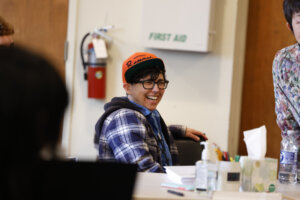A transparently Jewish musical is finally speaking its truth and singing its faith
Faith Soloway discusses the process of adapting the hit TV show ‘Transparent’ to the stage and putting it to music

Composer and lyricist Faith Soloway. Courtesy of Center Theatre Group/Mark Taper Forum
“Jewish and queer, that’s your headline,” Faith Soloway, the composer and lyricist behind the new musical, A Transparent Musical told me when I asked them about the show’s themes. As with all shows, the hope is that it will make its way to Broadway. There’s certainly been no shortage of Jews on Broadway, but this one seems destined to break even that mold.
So yes, it’s a Jewish story. It’s a queer story. And it’s also the next evolution of Transparent, the Emmy Award-winning series created by Faith’s sibling Joey Soloway who co-wrote the book to the musical with MJ Kaufman. Faith also contributed to the groundbreaking series which told the tale of the Pfeffermans, an upper-middle-class Jewish family in LA, based on the Soloways’ own family, whose Poppa, late in life, decided to speak their truth and transition to Moppa. In often blunt detail, Transparent explored the journey of the three Pfefferman siblings, their mother Shelly and the growing community of new friends they found after Maura’s truth was revealed.
I talked with Faith about Transparent and its own journey from real life to hit television show to stage musical. Full disclosure: I’ve been friends with Faith for almost 35 years; we were both members of Chicago’s Annoyance Theatre back in the proverbial day. Even more disclosure: Over the years, I spent several Jewish holidays with Faith and Joey at the home of their indefatigable mom, Elaine Soloway.
Faith and I spoke over Zoom, and we talked the way Jews talk, not always in a straight line. Faith has had an incredible career as a witty and substantive songwriter, inventive theater artist and educator, thoughtful Jew, queer advocate and proud mom.
There won’t be any spoilers in this piece, but I asked about the burden of creating a musical that served the stories the fans of the TV show would want to see, versus telling the story for the curious theater crowd just discovering the Pfeffermans on stage.
“That’s what’s good about the collaborative system,” Faith said. “The balance of some people who believe you really need to have these elements that service (Rabbi) Raquel, or other characters from the television show, and then there were others who were like, ‘nah, let’s take this opportunity to not care so much about this family, but let’s talk about queerness, the patriarchy, the binary. Fans will compare it to the television show, but people who come in for the first time will imprint their own feelings on it.”
The idea for the musical predated the TV show. Faith and Joey had already been seriously considering turning their family story into a musical documentary when Joey started getting a lot of buzz for their movie Afternoon Delight, which won awards and notice at Sundance and eventually led to the Amazon deal.
“Joey was the tree and I was one of the branches as a co-writer,” said Faith. “It was Joey’s questions and curiosities that drove the Jewish story lines and mapping narratives.”
Faith wrote on the show and played Cantor Joy in three episodes. Around season three, Faith started writing some songs for the characters, thinking that they might work their way into a musical one day.
An artist, Chicago-born

Born and raised in Chicago, Faith went to Indiana University, and at the age of 23, came back to Chicago and wrote music for an adaptation of Twelfth Night at the Victory Gardens Theater. On the strength of that show, Joyce Sloane, Second City’s legendary producer — and de facto Jewish mother to many in the Chicago theater community — offered Faith a job at Second City.
Around that same time, Faith was working with other IU friends on creating edgier, improv-based work that eventually became the Annoyance Theatre’s first shows. She wrote music and lyrics for shows such as Co-Ed Prison Sluts: The Musical and That Darned Anti-Christ while backing up improv shows as well. Their career at The Annoyance hit a new commercial high as Faith and Joey created The Real Live Brady Bunch — a lightning-in-a-bottle moment that felt like a wholly original take on the pop culture of a generation. Faith traveled with “the Bradys” for runs in New York and L.A.
Watching the finale of the TV show Transparent, you can hear the music and lyrics that feel so rooted in the no-holds-barred-toe-tapping tunes Faith created when they were in Chicago. I told Faith that I especially liked “Joyocaust,” the big, Hair-like production number that’s featured in the TV finale — dare I say advocating for a world overwhelmed with joy.
“You might have been the only one,” they said with a laugh.
“Is the stage musical a takeoff from the TV finale?” I asked.
“Not at all,” Faith said. “It’s starting from the beginning — it belongs to the television show in that the family characters are there and Davina is there, Raquel is there, but after that it deviates in different directions.
“It really becomes Ali’s story as they go on their own gender journey. We see the story through their eyes. Same question for the story though — what happens when a family member speaks their truth? How does it affect the family as this one character seeks to answer their own ‘who am I? question.”
The music from the finale isn’t in A Transparent Musical though. Nor are songs Faith wrote and workshopped at Joe’s Pub in New York and at activist fundraising concerts as well. Faith threw all of that out and started again. They say only some phrasing here or there survived the process. When they were working on the musical, Faith returned to some of the techniques they used back in their Chicago days, which involved a lot of trial and error and improvisation.
“For Co-Ed Prison Sluts, each actor improvised with me to find the songs, and for Transparent, these are all my own musings and improvisations, but I do put myself in the character’s shoes and improvise from there, so in some ways, not much changes for me. I really lean on my old acting-improvising chops to compose.” As fate — and casting directors — would have it, one of the actors in A Transparent Musical is Pat Towne, an old friend from The Annoyance, who auditioned without the Soloways knowing and snagged the role. In the end, it felt like a way to tie the past and present. “A nice emotional payoff that we get to play together again,” Faith said.
But what does mom think about all this?
When not working on the show from a corporate apartment in LA, Faith lives in Boston where they raised their daughter Betsy (who just published a debut novel) and has created theater, taught improv and music, and gigged for many years since leaving Chicago. They put a lot of their energy into education and creativity through the organization Rehearsal For Life, exposing kids and communities to improv and the joy of the creative life.
I asked Faith about Elaine, their mom. How did Elaine feel about the character of Shelly?
“She gets a kick out of the whole thing, but she knows that Shelly is not her. My mom is honored by it but has a sense of humor about the portrayal,” Faith said. “My mom is a great example of what to strive for as you get older. She’s in great shape — she recently emailed Joey and I her cholesterol results. Look at the way people do life — maybe especially Jews — with our anxiety and depression running through us. Mom’s push to be happy, healthy, and grateful is a beacon for me.”
“Would your mom want to do a one-woman show like Shelly did in the finale?” I asked.
“No, but the one-woman show idea came from me,” Faith said. “I’ve always wanted to do a show called Journey to The Self: One Woman’s Self Journey — about a woman who felt robbed of the chance to articulate any of her life’s pains.”
A Transparent Musical runs through June 25 at the Mark Taper Forum in Los Angeles.
A message from our Publisher & CEO Rachel Fishman Feddersen

I hope you appreciated this article. Before you go, I’d like to ask you to please support the Forward’s award-winning, nonprofit journalism so that we can be prepared for whatever news 2025 brings.
At a time when other newsrooms are closing or cutting back, the Forward has removed its paywall and invested additional resources to report on the ground from Israel and around the U.S. on the impact of the war, rising antisemitism and polarized discourse.
Readers like you make it all possible. Support our work by becoming a Forward Member and connect with our journalism and your community.
— Rachel Fishman Feddersen, Publisher and CEO





























